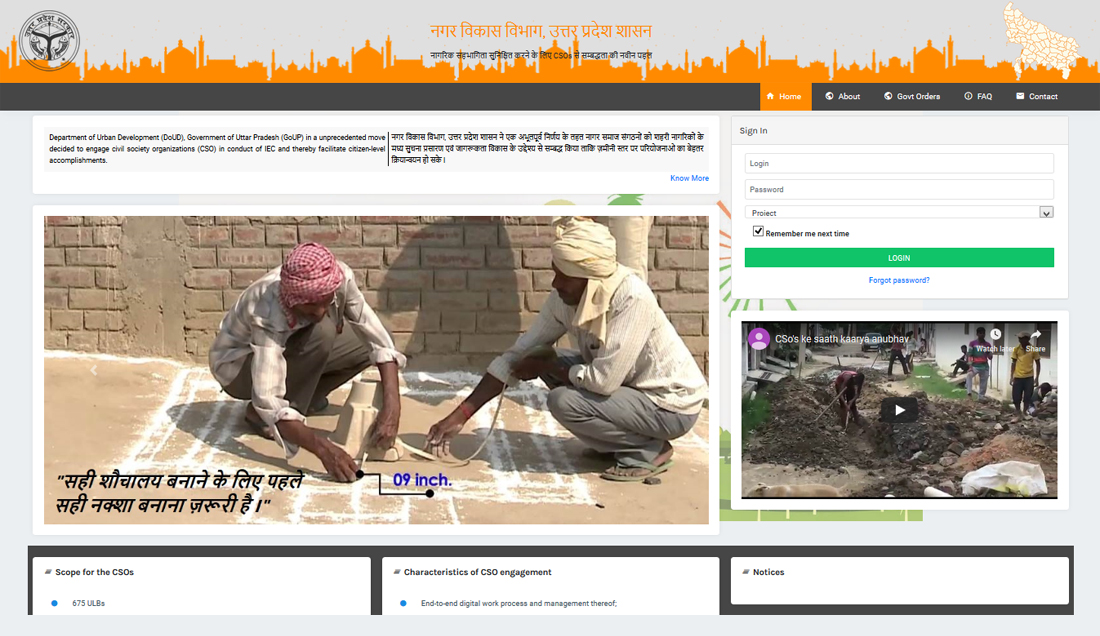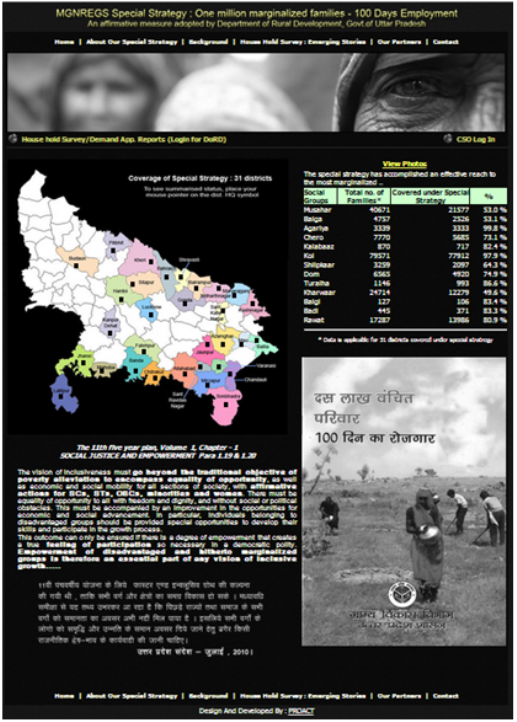The Poorest Areas Civil Society (PACS) program (2001–2008) was designed to help millions of people living in some of India’s poorest districts through a network of 665 civil society organizations (CSO); it covered almost 20,000 villages in 94 districts in 6 Indian states. PACS received over $25 million funding from the UK’s Department for International Development (DFID). DA-PwC Consortia was assigned as the Management consultants at the National level. PROACT as supportive supervision resource organization (SSRO) was entrusted for management of state programs. To effectively manage a large program spread over a wide geographical area (six states and over 17,000 villages), the PACS program Management Consultants appointed several reputed consulting firms as ROs at the state and national levels. The tasks undertaken by the ROs included (a) Helping CSOs in proposal development,
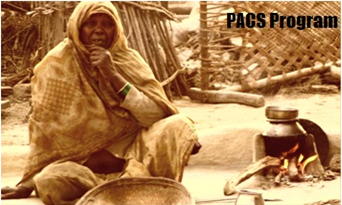
(b) Carrying out supportive supervision, (c) Developing communication strategies, (d) Providing process documentation, (e) Preparing strategy papers, and (f) Analyzing proposals etc. PROACT has been one of the first state-based ROs; also the longest serving RO (from June 2003 till the end of the program in 2008). As RO it started with managing the program in the state of UP subsequently taking charge of also managing Bihar and Jharkhand based projects.
As an RO, PROACT discharged responsibilities pertaining to supporting & guiding CSOs around technicalities of program themes and implementation modalities, conducting time-bound monitoring and concurrent evaluation of projects implemented by civil society organizations (CSO) as partnering with PACS program. Professional scope for PROACT in PACS program management was spread in approx. 60 districts of UP, Bihar and Jharkhand; involving more than 150 CSOs implementing individual and network-based projects on themes such as : (a) local self governance, (b) women’s empowerment, (c) social cohesion, (d) policy advocacy, and (e) self-help initiatives.
As an RO, PROACT discharged responsibilities pertaining to supporting & guiding CSOs around technicalities of program themes and implementation modalities, conducting time-bound monitoring and concurrent evaluation of projects implemented by civil society organizations (CSO) as partnering with PACS program. Professional scope for PROACT in PACS program management was spread in approx. 60 districts of UP, Bihar and Jharkhand; involving more than 150 CSOs implementing individual and network-based projects on themes such as : (a) local self governance, (b) women’s empowerment, (c) social cohesion, (d) policy advocacy, and (e) self-help initiatives.
Nature of assignment – Program management & supportive supervision : External Monitoring & Concurrent Evaluation, learning & documentation; supporting proposal development & program analysis.
Sector – Poverty, entitlements of the poor, rural employment & livelihoods – range of social sector issues
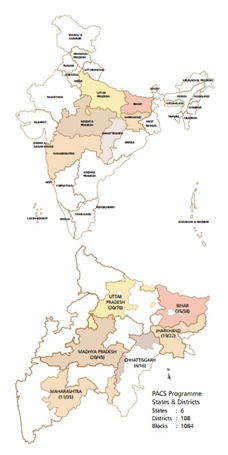
Vision, mission and values
With beliefs in social justice, Next Step will strive to make the world a place where every one has the right to build a future free from poverty, deprivation and inequality.
Next Step will endeavor to fulfill its mission statement 'to work with the poor, using their own skills and knowledge to suggest, render and develop sustainable solutions to poverty’. Based on its experience, the organization shall inform and influence national and continental debates on development whenever it finds an opportunity to do so.
With a commitment to support the most vulnerable in the society to achieve their full potential, Next Step sees empowerment of the communities it works with central to its approach. Building on local knowledge by working in partnership with local communities,Next Step aims to be efficient and accountable in supporting the delivery of high quality programmes. It is committed to learning from its own experience and facilitating by learning of others.
Objectives and scopes
Furtherance of concept/ ideas of social development being the core function the Next Step would conceptualize various changing dimension of social development in context of its viability based on location and target community. The ideas for bringing out social development would have to be cultivated and put for practicing with support of community and other agencies.
Website: http://nextstep.org.in

Vision, mission and values
Special Strategy on MGNREGS – one million most marginalized families – 100 days employment : One of the most radical initiatives by any state government in India; the pilot was conceptualized by Department of Rural Development (DoRD), Government of Uttar Pradesh (GoUP) to reach out to the poorest sections of rural UP by recognizing their socio-economic marginalization. The basis was formed through empirical evidences and thorough research undertaken by eminent institutions.
The assignment redefined the state of rural poverty and its extremity in UP. MGNREGS being a programmatic vehicle, PROACT as the State Nodal Agency was mandated to guide and technically assist the state machinery to comply with the implementation process as was provided in the act. The survey of caste-defined families, making a case of extreme poverty and marginalization, obliged the GoUP to deliberate as how MGNREGS and other similar poverty-centric programs should be conducted more pragmatically. The assignment considered targeting 73-74 caste groups from SCs and OBCs; covered 231 blocks of 31 districts, was spread in nearly 7,400 gram panchayats.
One of the largest dynamic databases, the web-portal consists of twin dataset for 12.26 lakh families, an account of the findings of the survey undertaken as part of the assignment is as follow -
- Approx. 69% of the families identified (nearly 8.45 lakh) were found to be landless. Of those having land, 48% were in patta (lease);
- 68% of these families (8.39 lakh) did not have MGNREGS job cards. Those had, only 8.5% were women job card holders;
- 88% of these families did not have either of BPL card, Antyodaya card or assuming benefit of any social security/ pension scheme;
- Approx. 1.05 lakh families were identified as single-women-headed or senior-citizen-headed;
- 73% of the total families were found to be financially excluded _ not have a bank account;
Nature of assignment – Nodal agency for implementation of Special Strategy of GoUP : Program management & supportive supervision : Supporting and facilitating demand-side process compliance. Facilitating supply-end delivery of process milestones (a) Provision of job cards, (b) issuance of demand applications and (c) realization of employment & timely payment.
Sector – Poverty, rural employment
CMO of the government of UP(GoUP) is implementing an innovative project on raising platforms of hand pumps in flood affected and waterlogged areas.
The project is spread in 21 districts of the Terai and Eastern regions of the state across more than 2500 villages. The innovation (as referred to hereinafter) has gained prominence because of its pragmatic demand on the ground, something which is modelled around few non-state initiatives in district Bahraich and few other places during the period of 2007-10. There are instances from across the underdeveloped world to have experimented with spot-drinking water sources, innovating with design and technology and attempt improvement in quantitative service aspects. In India, there is no recorded evidence of government entities making such endeavour.
Website: http://innovation.proact.website
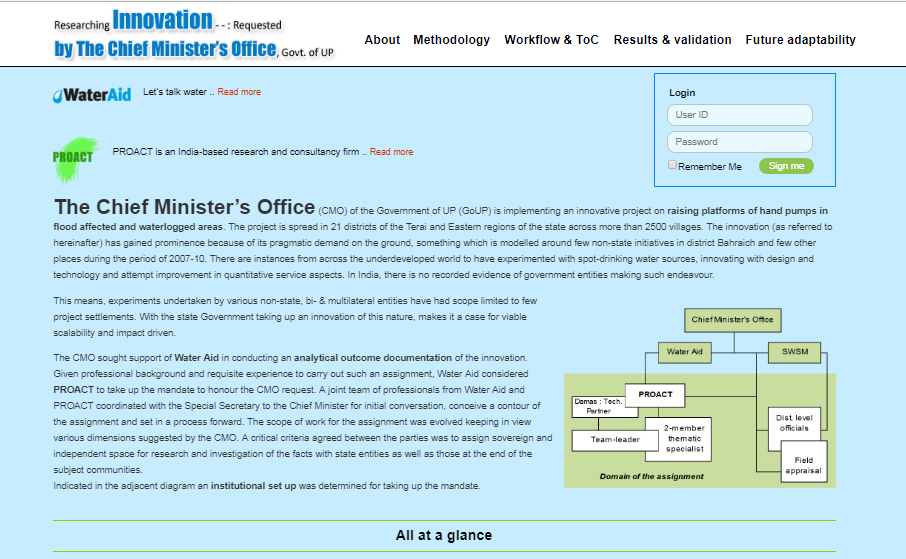
The CMO sought support of Water Aid in conducting an analytical outcome documentation of the innovation. Given professional background and requisite experience to carry out such an assignment, Water Aid considered PROACT to take up the mandate to honour the CMO request. A joint team of professionals from Water Aid and PROACT coordinated with the Special Secretary to the Chief Minister for initial conversation, conceive a contour of the assignment and set in a process forward. The scope of work for the assignment was evolved keeping in view various dimensions suggested by the CMO. A critical criteria agreed between the parties was to assign sovereign and independent space for research and investigation of the facts with state entities as well as those at the end of the subject communities.
Agricultural credit flow in India a study conducted by Banker’s Institute of Rural Development (BIRD) with field assistance from PROACT. The study was supported by GIZ, Germany. The study covered 5 states of India from different agro-climatic contexts sampling across respondents from wide variety of social (religious, caste and gender), occupational and economic categories.
This is an assignment that set up with BIRD & GIZ an entirely ICT-based paradigm for primary research methodology. PROACT investigators carried out the primary study equipped with internet-equipped notebooks also having an option of off-line data entry.
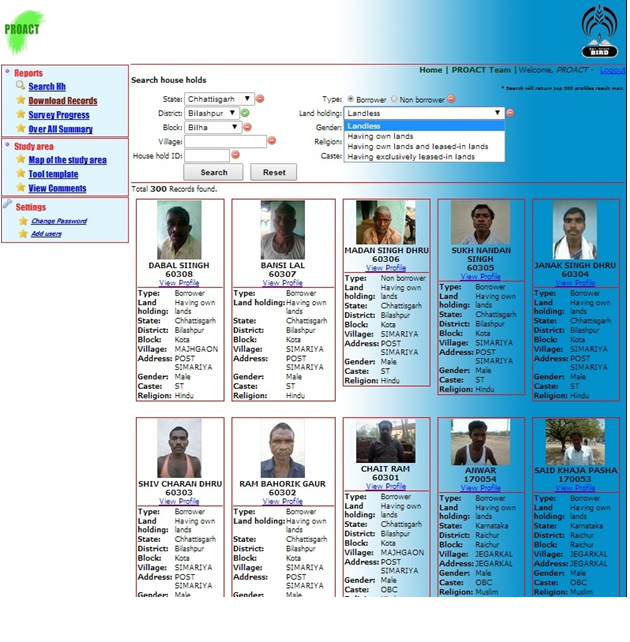
Website: http://bird.proactindia.in
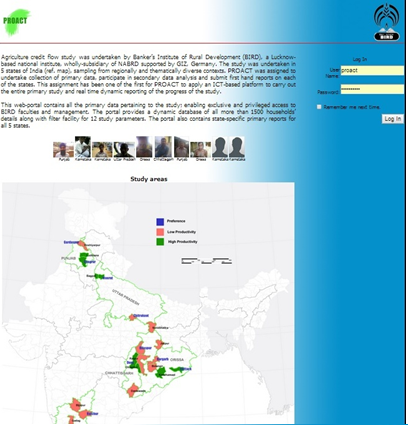
Nature of assignment- Program management & supportive supervision : External Monitoring & Concurrent Evaluation, learning & documentation; supporting proposal development & program analysis.
Sector - Poverty, entitlements of the poor, rural employment & livelihoods – range of social sector issues
Baseline and longitudinal study of Secondary educationprojects implemented by CSOs, projects supported by Kusuma Foundation/ Trust. This portal hosts details of four assignments on Secondary education – 3 baseline studies and 1 longitudinal study.
The Gross Enrollment Ratio (GER) at the secondary school stage (Classes IX–X) is currently around 60.0 per cent which is woefully low. With UEE becoming a reality, near universalization of secondary education is a logical next step. Anticipating this, the scheme of Rashtriya Madhyamik Shiksha Abhiyan (RMSA) and the Scheme of Model schools were launched in the Eleventh Plan to improve enrolment and quality in secondary education.
It now appears desirable that efforts in this direction are expedited and RMSA is made a single comprehensive scheme to address issues of coverage and quality in secondary education in a holistic manner. Girls’ education, particularly in special focus areas could be further incentivised and innovations in school education promoted with untied funds. While stepping up public investment in the sector by the Central and State Governments would be necessary, it is imperative that the private sector capabilities are fruitfully tapped particularly as a majority of our secondary schools, including aided schools, are under private management. Models for PPP in this sector also need to be vigorously explored.
Nature of assignment- Baseline and longitudinal study – classical blend of primary, participatory and secondary research methodologies. Program analysis leading to specific inputs aiding project management assumptions has been core to these assignments.
Sector - Secondary education, vocational education, bridge-school and employability
Website: http://kusuma.proactindia.in
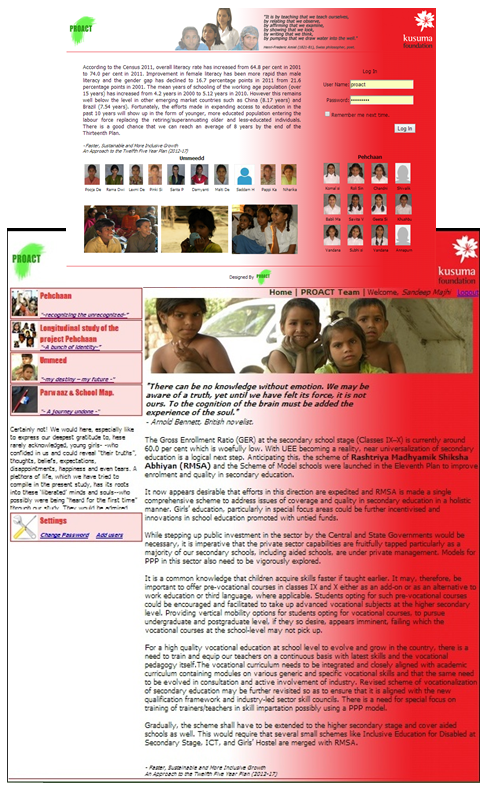
External Monitoring & Concurrent Evaluation (including documentation) (MELD) of Integrated Watershed Management Program (IWMP) in Uttar Pradesh.
IWMP is a national flagship initiative to improve degraded land into pasture and cultivable lands the GoI earmarking INR 29,000 Crore in the 12th five year plan period (2012-17). The program was conceptualized, initiated in 2009-10; the Government of Uttar Pradesh (GoUP) rolling out several projects in the same year. Since 2009-10 to the present, the GoUP has perceived, received sanction from Government of India (GoI) for 537 projects covering approx. 25 lakh hectares (ha) of degraded land located in 71 districts of the state. Going by the provision of the Common Guidelines 2008 (revised 2011) of GoI, all the states are mandated to induct third party Monitoring & Concurrent Evaluation (M&E) Agencies for technical assistances to the project implementation agencies (PIA) as well as other concerned tasks. In case of UP, PROACT as the External M&E Agency by its mandate has been assigned additional responsibilities of documentation of implementation processes.
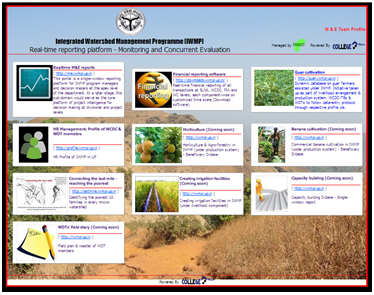
Equipped with several distinct domains, this assignment of PROACT helped setting up host of imaginative project management applications entirely-based on information & communication technology (ICT). Of the 471 projects that PROACT is dealing with (the remaining not yet taken off), PROACT’s web-based facilities provide real-time and dynamic database development, reporting facilities for (a) human resources engaged in all the projects across 71 districts, (b) real-time financial reporting customized for given time spans, levels of operation (state, district, project, gram panchayat levels) and reporting against project components, (c) database and process reporting of last-mile connectivity - - livelihood and developmental initiatives for asset-less families, (d) beneficiary database and dynamic progress reporting of input-output equation and also (d) a formal physical reporting portal of PROACT to the authorities. In future, PROACT has on board a host of proposals for ICT-based database compilation as well as dynamic reporting of project implementation processes. This includes functional instruments also aiding capacity building and workflow management at the PIA functionary level.
Nature of assignment- External Monitoring & Concurrent Evaluation, learning & documentation; supporting PIAs in thematic as well as project management technical issues. Fully ICT-driven reporting and documentation.
Sector - Watershed management/ Natural Resource Management
One of the first of its kind, the study-series signifies and records intricacies of economy that performs in an indigenous Indian Cluster economy. The study was undertaken in partnership with Locus Analytics (http://home.locus), a New York-based think tank and economic research firm. Study series underway, the first two phases conducted (a) a scoping study, and (b) a comprehensive primary survey around functional and economic issues of handloom weaving clusters in Uttar Pradesh, India. A paper-less research exercise, the second phase of the assignment came out with revealing learning on broad themes; besides (a) economics of all the types of functional entities, (b) social-anthropologic aspects of the weaving community, the aspects of (c) government initiatives and (d) contextual relevance working for the cluster economy.
Besides NABARD, all relevant government agencies, all corporate & industry forums accessed in Delhi and Lucknow, banks and concerned state government line departments were interfaced. A presentation of the findings was made at the World Bank drawing applaud for both PROACT and Locus Analytics. Project Managers of Locus Analytics, connected with the study from New York expressed their feelings about PROACT as : “The two of us - - - -, would like to extend our appreciation for the extensive research work and attention to detail your group has undertaken in the second stage of Lucknow.Locus.
Website: http://locus.proact.website
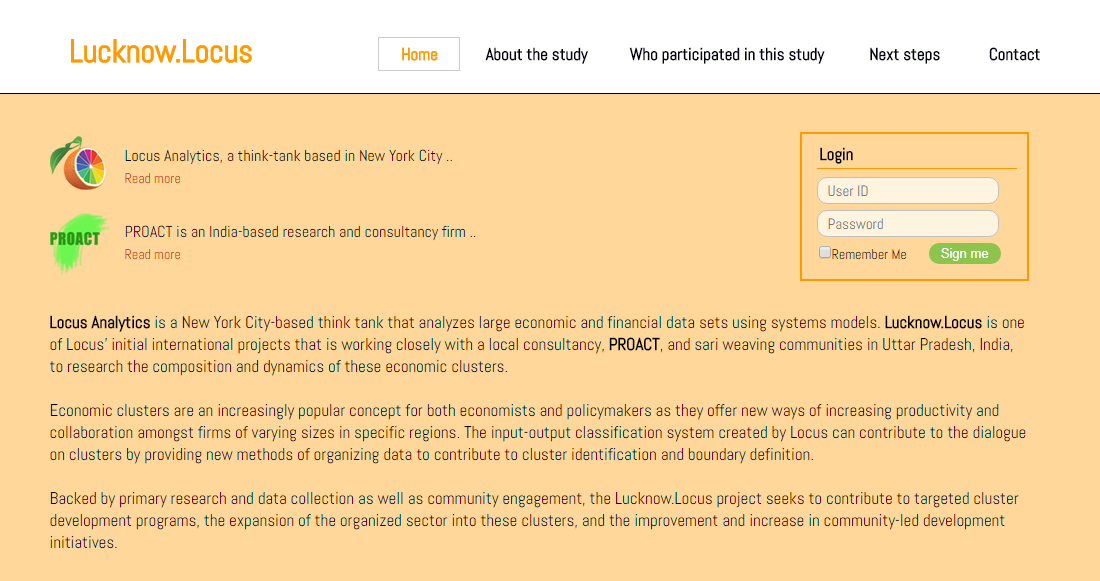
We have been impressed by the depth and quality of the primary and secondary research carried out to thoroughly understand the material that this project concerns. In writing this note, we recognize the worth of the extra effort put in by PROACT as the scope of the project expanded and are appreciative of the fact that the organization is interested in the long term benefit of the project and the relationship. We look forward to the data as we hope that it will be exemplary and will demonstrate the promise of quality and depth of the work that PROACT has invested in the project.”
Department of Urban Development (DoUD), Government of Uttar Pradesh (GoUP) in a unprecedented move decided to engage civil society organizations (CSO) in conduct of IEC and thereby facilitate citizen-level accomplishments. The CSO-engagement is perceived in accomplishment of results in significant areas e.g. house sewer connection, house drinking water connection and individual household latrines respectively under the state missions of State Mission for Clean Ganga (SMCG)/ Namami Gange, Atal Mission for rejuvenation of Urban Transformation (AMRUT) and Swachh Bharat Mission – Urban (SBM-U). A robust process of selection was adopted to select 21 and 29 CSOs respectively for (a) Namami Gange and (b) SBM-U & AMRUT. To supervise work of and capacitate the CSO cadres on the ground, 6 Mother CSOs have been engaged for assignments under the SBM-U and AMRUT. Finally, to monitor the CSO assignments, conduct physical verification of same and develop technological solutions for project management, 2 state support units have been inducted.
